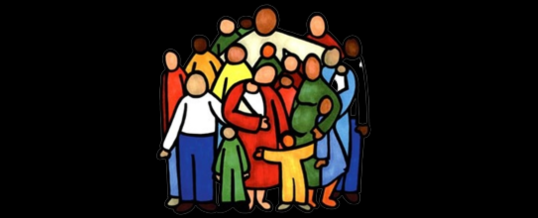
Church. Why bother?
Back in the 1st century when the Church was just getting going, St. Paul wrote, “Now you are the body of Christ, and each one of you with a part to play in the whole” (1 Cor. 12:27). The way God designed our bodies is a model for understanding our lives together as the Church. Every part of our physical body is dependent on every other part. You are part of Christ’s body—that’s who you are. Only as you accept your part of that body does your “part” mean anything.
One of the things I like about the Catholic Church is its sacramentality and imagination, even if they are not always understood, appreciated, or expressed as well as they should be. Unlike some forms of Christianity, we Catholics are still mystified by good art, wine, bread, oil, statues, foot washing, ashes, etc. I only wish we were more demonstrative with our symbols. When we are, we communicate—in more powerful ways than words—the lavish ways God comes to us and loves us. Given that, I equally believe that God is not confined to the four walls of our houses of worship. While the sacraments hold a primary position in the life of the Church, the entire created world—every arena of our lives–is shot through with the presence of the Divine. Everything, in a sense, is sacramental.
If God is everywhere, why bother “going to church”? Wouldn’t we do just as well claiming, as many do, “I am spiritual but not religious”? Or, how about this one, “I’m free; I don’t need organized religion. I march to my own drumbeat, thank you very much.”
The truth of it is we come to a church building in order to learn what it means to be Church, the Body of Christ. It’s a work in progress and always will be. (That’s probably why Eucharist is a repeatable sacrament and why we are called “practicing Catholics”). We come to get refocused, empowered, renewed, strengthened, and fed so that we can leave here more aware that we are, indeed, the Body of Christ. Jesus told us that he came to be food for the world…not just for Catholics, not just for Catholics in a state of grace…but for the WORLD! (Jn. 6:33). If that’s the case, then as the Body of Christ we should leave worship with the same attitude—that we, too, are food for the world.
Going to church should free us from the delusion that we are the center of the universe. At great personal price, Nicolaus Copernicus and later Galileo Galilei (with the help of the telescope) paved the way for a new way of thinking. Thinking ourselves, or our earth, as being the center of the universe limits our ability to see and experience God whose presence is everywhere. Going to church and being forced to rub shoulders with others—others that we may not even like—is as challenging as accepting the sun, and not the earth, is central in our universe. Going to church is going to a place not of our choosing, to be with people not necessarily of our choosing, and breaking bread with people not of our choosing. It’s not a country club where we get to decide who’s in and who’s out. One of the last things Jesus said before his crucifixion was, “You didn’t choose me, no, I chose you” (Jn. 15:16). So, we are not the masters of the gate in a gated community.
I’ve had the privilege of being to Rome, of presiding Eucharist just a few metres away from St. Mark the Evangelist’s remains in Venice and equally close to the remains of St. Francis of Assisi. I’ve also had the honour of celebrating Eucharist in Bethlehem and on the Mount of the Beatitudes by the Sea of Galilee. Yet, not of these sacred place are any more sacred than the chapel at the Dorchester Prison or the local senior citizen homes. What makes a place sacred is not geography but the truth that, “Where two or three are gathered in my name, I am among you” (Mt. 18:20). Before each celebration I need to remind myself that no one travels to God alone. From palaces to prisons, ever person is responding to Jesus’ words, “You didn’t choose me, no, I chose you.” We’re in this together—the Body of Christ—motivated by something beyond the messiness of our own ambitions and drives.
Although not commenting directly about Church, Brennan Manning, touches on it nonetheless when he writes: “When I am honest, I admit I am a bundle of paradoxes. I believe and I doubt, I hope and get discouraged, I love and I hate, I feel bad about feeling good, I feel guilty about not feeling guilty. I am trusting and suspicious. I am honest and I still play games. Aristotle said I am a rational animal; I say I am an angel with an incredible capacity for beer” (The Ragamuffin Gospel).
~Fr. Phil
FEB
2025

About the Author: